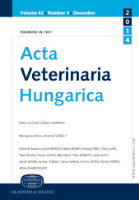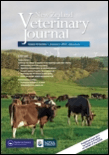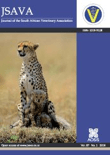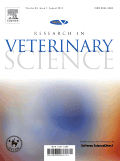
WIENER TIERARZTLICHE MONATSSCHRIFT
Scope & Guideline
Championing animal welfare through rigorous scholarship.
Introduction
Aims and Scopes
- Veterinary Clinical Research:
The journal publishes studies that evaluate clinical practices, treatment outcomes, and novel therapeutic approaches in various animal species, including companion animals, livestock, and wildlife. - Zoonotic Diseases and Public Health:
Research addressing the interaction between animal health and human health, particularly the transmission of zoonotic diseases, is a significant focus area. - Animal Welfare and Ethics:
The journal emphasizes studies that explore animal welfare issues, including enrichment strategies, housing conditions, and the ethical implications of veterinary practices. - Comparative Medicine:
Publications often include comparative studies between species to enhance understanding of diseases and treatment approaches, which can lead to improved outcomes in veterinary medicine. - Epidemiology and Preventive Medicine:
The journal covers epidemiological studies that inform preventive measures against diseases in animal populations, contributing to better herd health management. - Food Safety and Quality:
Research related to food safety, quality assurance in animal products, and the impact of veterinary practices on the food supply chain is a consistent theme.
Trending and Emerging
- Nanotechnology in Veterinary Medicine:
Emerging studies focus on the application of nanotechnology, such as curcumin nanoparticles, indicating a growing interest in innovative treatment modalities that enhance therapeutic efficacy. - Animal Welfare Enhancements:
Research aimed at enhancing the quality of life for laboratory and companion animals through enrichment strategies is increasingly prevalent, reflecting a broader societal emphasis on animal welfare. - Infectious Disease Management:
The journal shows a rising trend in publications related to the management and understanding of infectious diseases, including zoonoses, which is critical in the context of global health. - Nutritional Research and Food Safety:
There is an increasing focus on the safety and quality of animal feed, as well as its impact on health, indicating a trend towards improving food production systems. - Use of Advanced Diagnostic Techniques:
The adoption of advanced diagnostic methodologies, such as immunochromatographic tests and imaging techniques, is becoming more common, reflecting a trend towards precision medicine in veterinary practice.
Declining or Waning
- Traditional Surgical Techniques:
There has been a noticeable decline in papers focusing on traditional surgical methods, suggesting a shift towards less invasive techniques and more innovative approaches in veterinary surgery. - Purely Descriptive Studies:
The journal has moved away from studies that provide purely descriptive data without significant analytical depth or clinical implications, favoring more robust research designs. - Studies with Limited Clinical Relevance:
Research that lacks direct application to current veterinary practice or fails to address pressing issues in animal health appears to be less common in recent issues.
Similar Journals

Slovenian Veterinary Research
Your Gateway to the Latest in Veterinary ResearchSlovenian Veterinary Research, published by the University of Ljubljana, serves as a significant platform for the dissemination of research within the veterinary field. With an ISSN of 1580-4003 and an E-ISSN of 2385-8761, this open-access journal has made its content freely available to the global research community since 2021, enhancing accessibility and engagement. The journal's scope includes a diverse range of topics relevant to veterinary science, aiming to foster innovation and collaboration among researchers, professionals, and students in the field. Although currently categorized in the Q4 quartile for veterinary studies, the journal is committed to improving its impact and visibility, particularly as it converges on its upcoming years of operation from 2007 to 2024. As it strives to elevate its Scopus ranks, currently positioned at rank #162/194 in General Veterinary, Slovenian Veterinary Research provides a vital resource for advancing knowledge and best practices in veterinary medicine. For anyone interested in the latest veterinary research trends and findings emanating from Slovenia and beyond, this journal represents an essential source of information.

Open Veterinary Journal
Elevating Veterinary Education with Open InsightsOpen Veterinary Journal, published by the University of Tripoli, Faculty of Veterinary Medicine, offers a vital platform for the dissemination of research in the field of veterinary sciences. With an ISSN of 2226-4485 and an E-ISSN of 2218-6050, this journal has been committed to open access since 2011, allowing for unfettered access to its content, which ensures that researchers, practitioners, and students worldwide can benefit from the latest veterinary research findings. Operating from Libya, it has garnered an important position within the academic community, achieving a Q2 quartile ranking in the scope of veterinary (miscellaneous) and maintaining a Scopus rank of 104 out of 194 within the general veterinary category, indicating its growing influence and reach. The journal focuses on a diverse array of topics pertinent to contemporary veterinary practice, aiming to bridge gaps in knowledge and foster collaboration among scholars and practitioners. As it continues to publish original research and reviews, Open Veterinary Journal stands as a crucial resource for advancing veterinary medicine, supporting innovative research, and enhancing educational outcomes within the profession.

ACTA VETERINARIA HUNGARICA
Pioneering insights for the global veterinary community.ACTA VETERINARIA HUNGARICA is a prestigious academic journal published by AKADEMIAI KIADO ZRT, dedicated to the diverse field of veterinary science. With a history spanning over three decades since its inception in 1983, this journal provides a platform for the dissemination of high-quality research, clinical studies, and reviews that contribute to advancing knowledge in veterinary medicine and animal health. Based in Hungary, it has built a respectable reputation, reflected in its Scopus ranking, where it occupies the 84th position out of 194 in the General Veterinary category, placing it within the 56th percentile. Although the journal is not open access, it continues to attract a global audience of researchers, professionals, and students who are keen on exploring advancements in veterinary science as it converges towards its upcoming year of 2024. Readers will find valuable insights that foster innovation and improve animal care practices across various settings, making ACTA VETERINARIA HUNGARICA an essential resource for anyone involved in the veterinary field.

Journal of the Hellenic Veterinary Medical Society
Exploring the frontiers of veterinary knowledge and practice.Welcome to the Journal of the Hellenic Veterinary Medical Society, a premier platform dedicated to advancing the field of veterinary medicine through high-quality research and scholarly discourse. Published by the Hellenic Veterinary Medical Society, this journal serves as a vital resource for veterinarians, researchers, and students who are committed to the advancement of animal health and welfare. With an ISSN of 1792-2720 and a recognized status in the community, the journal publishes impactful studies that contribute to the understanding of various veterinary disciplines. Although the journal currently sits in Q3 of the Veterinary (miscellaneous) category with a Scopus ranking of #157/194, it aims to elevate its reach and impact within the scientific community, fostering a culture of innovation and knowledge sharing. The journal strictly adheres to open access principles, ensuring that its findings are readily available to all, thereby promoting collaboration and comprehensive learning. By participating in this esteemed journal, authors and researchers contribute to the rich history and ongoing dialogue of veterinary science that dates back to its founding in 1953. We invite you to explore, engage, and contribute to the growing body of knowledge in veterinary medicine.

NEW ZEALAND VETERINARY JOURNAL
Enriching knowledge in veterinary science since 1952.NEW ZEALAND VETERINARY JOURNAL, published by Taylor & Francis Ltd, stands as a pivotal platform in the realm of veterinary science, contributing significantly to the global discourse on animal health and welfare since its inception in 1952. With an ISSN of 0048-0169 and an E-ISSN of 1176-0710, this journal offers invaluable insights within both the veterinary and general medical fields, currently achieving a commendable Q2 ranking in Veterinary (miscellaneous) and Q3 in Medicine (miscellaneous) for 2023. Its Scopus ranking places it in the 76th percentile among veterinary journals, affirming its high-impact presence in academia. While access to this journal is not open, it maintains an essential role for researchers, professionals, and students aiming to advance their knowledge and contribute to the field of veterinary science. With a commitment to disseminating quality research, NEW ZEALAND VETERINARY JOURNAL enriches the understanding of veterinary practices and enhances ongoing dialogue on critical health issues affecting animals, promoting better outcomes through scientific inquiry.

Journal of the South African Veterinary Association
Championing Veterinary Knowledge Since 1945Journal of the South African Veterinary Association is a prominent Open Access journal dedicated to advancing the field of veterinary science since its inception in 1945. Published by MEDPHARM PUBLICATIONS PTY LTD, this journal stands out with an impactful HIndex and a commendable categorization in 2023, ranking Q3 in Medicine (miscellaneous) and Q2 in Veterinary (miscellaneous). With a Scopus rank of 96 out of 194 in the veterinary field, it serves as an essential resource for researchers, veterinary professionals, and students, promoting the dissemination of high-quality research and knowledge. The journal offers a platform for peer-reviewed articles covering diverse topics relevant to veterinary and animal health issues, encouraging expansive dialogue and collaboration within the academic community. Based in Centurion, South Africa, and accessible globally since it adopted an Open Access model in 1997, the journal exemplifies a commitment to accessibility and the sharing of knowledge.

Brazilian Journal of Hygiene and Animal Sanity
Exploring the vital link between animal welfare and public health.Brazilian Journal of Hygiene and Animal Sanity is an esteemed academic publication dedicated to advancing the fields of veterinary science, animal health, and public health in Brazil and beyond. Published by UNIV FEDERAL CEARA, CENTRO CIENCIAS AGRARIAS, this journal serves as a vital resource for researchers, professionals, and students, providing peer-reviewed articles that explore critical issues related to hygiene practices, disease prevention, and animal welfare. With an ISSN of 1981-2965, the journal prioritizes the dissemination of innovative research findings and methodologies, aiming to impact the quality of life for both animals and humans significantly. Although currently not an Open Access journal, it continues to seek partnerships that will enhance its reach and accessibility. Situated in Fortaleza, Brazil, the journal is poised to become a cornerstone for those engaged in the study and improvement of zoonotic diseases and sanitation practices, reflecting the essential intersection of animal health and public wellbeing.

Kleintierpraxis
Bridging research and practice in small animal medicine.Kleintierpraxis is a prominent journal dedicated to the field of small animal veterinary science, published by M H SCHAPER GMBH CO KG in Germany. With an ISSN of 0023-2076, the journal aims to disseminate cutting-edge research, clinical findings, and advancements in veterinary practices affecting small animals. Although it is categorized within the Q4 quartile for Small Animals in 2023 and holds a Scopus rank of 20 out of 20, its role in providing valuable insights to practitioners, researchers, and students in veterinary medicine cannot be underestimated. The journal covers a wide range of topics pertinent to veterinary care, diagnostics, and treatment methodologies, offering an essential resource for understanding the complexities of small animal health. While currently not open access, Kleintierpraxis continues to be a vital contribution to the veterinary literature landscape from 1996 through 2024, fostering professional development and knowledge within the community.

EGYPTIAN JOURNAL OF VETERINARY SCIENCE
Driving change in animal health and management.Welcome to the Egyptian Journal of Veterinary Science, a pivotal publication dedicated to advancing the field of veterinary science, particularly within the unique context of Egypt and the surrounding regions. Published by the Natl Information Documentation Centre, this journal has been a key scholarly resource since its inception in 1977, focusing on diverse aspects of veterinary medicine, including animal health, nutrition, and management practices. With an impressive editorial commitment and a wide scope covering animal science, equine studies, food animals, and small animal veterinary practice, the journal stands as a critical platform for researchers and professionals alike. While currently categorized in Q4 for Animal Science and Zoology, and achieving Q3 rankings in several other veterinary subfields, it serves as a vital avenue for disseminating innovative research and practical insights. Access to the latest findings and case studies aims to foster improved veterinary practices and enhance animal welfare standards. As we navigate the complexities of veterinary science, the Egyptian Journal of Veterinary Science remains an essential tool for those committed to the health and welfare of animals across various disciplines.

RESEARCH IN VETERINARY SCIENCE
Pioneering Research for Innovative Veterinary PracticesRESEARCH IN VETERINARY SCIENCE, published by Elsevier Science Ltd, stands as an authoritative platform in the field of veterinary studies. With its origins dating back to 1965, this prestigious journal is recognized for its contribution to the advancement of veterinary knowledge and practices, boasting a remarkable Q1 categorization in Veterinary (miscellaneous) and ranking 24th out of 194 in the Scopus veterinary general category, placing it in the top 13% of its field. The journal presents a diverse range of research articles that explore critical topics in veterinary science, thereby facilitating evidence-based practices and innovations. Although currently not an open-access journal, it remains highly accessible through institutional and personal subscriptions, allowing researchers, professionals, and students to benefit from its rich collection of studies. As it moves toward 2024, RESEARCH IN VETERINARY SCIENCE continues to be a vital resource for those dedicated to improving animal health and advancing veterinary science.